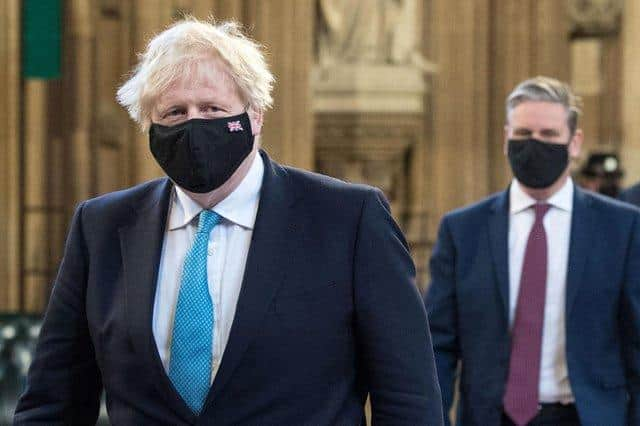Boris Johnson in Scotland: 'Prime Minister's visit hinders the Union', says Keir Starmer as Johnson insists he's working 'very hard' with Scottish Tories
The Labour leader made the point as Boris Johnson visited Fife and Edinburgh on Monday in a rare trip to Scotland following the announcement of plans around freeports.
In an interview with the BBC, Sir Keir said: “Almost every time the Prime Minister crosses the border into Scotland, he makes the case for the union harder.
“We do have a duty to make a strong case for the union.


Advertisement
Hide AdAdvertisement
Hide Ad“That’s what I’ve been doing when I go to Scotland, but this Prime Minister does not help that cause.”
Mr Johnson said he was “working very hard” with Scottish colleagues when asked if he still had authority in Scotland.
The assertion comes after Scottish Tories leader Douglas Ross called for the Prime Minister to resign over the ‘partygate’ row.
Police are investigating a total of 12 gatherings in Downing Street on eight dates in an inquiry called Operation Hillman, which is examining whether Covid restrictions were broken.
Mr Johnson is believed to have attended as many as six events linked to the police investigation.
On a visit to Rosyth, Mr Johnson said: “I’m working very hard with my colleagues in Scotland on our joint agenda of uniting and levelling up, and delivering for the people of the whole UK.
“I think we’re very proud collectively of what the UK Government has done at all levels to get us through Covid very effectively, so that we now have the fastest-growing economy in the G7 last year and this year, plus we’re working together on great projects which we’re able to do such as the free ports and such as investment in Rosyth.”
Downing Street has said the Prime Minister’s responses to his police questionnaire into gatherings at Number 10 would not be made public.
Advertisement
Hide AdAdvertisement
Hide AdBut Boris Johnson insisted he would have “a lot more” to say on the partygate row once the police investigation is concluded.
The Metropolitan Police has sent the questionnaire to about 50 people as it investigates the gatherings at Number 10.
On an official visit to Scotland, Mr Johnson was asked whether he had responded to the police questionnaire yet.
He said: “All that process has got to be completed before I can say anything more, but I look forward to telling you a lot more in due course.”
But the PM’s official spokesman said: “As we said on Friday, we will respond as required. As you know, I think the Met made clear that that was in seven days, so we will comply with that requirement.”
Asked if the responses would be made public, the spokesman said: “No.”
The Prime Minister may face growing calls to resign if he cannot convince police he was not in breach of regulations, and has reportedly begun preparing legal advice.
As he employs the help of personal lawyers, the Telegraph cited Mr Johnson’s allies in reporting he plans to argue he was working in his official Downing Street flat on the night of the alleged “Abba party” in November 2020.
Advertisement
Hide AdAdvertisement
Hide AdThe Times reported even if Mr Johnson is fined he will not resign, in a move that would be likely to trigger Tory MPs to force a vote of confidence in his leadership.
Scotland Yard says the questionnaires ask for an “account and explanation of the recipient’s participation in an event” and have “formal legal status and must be answered truthfully”.
Fifteen Tory MPs have publicly called for Mr Johnson to quit, while more are thought to have privately written to the 1922 Committee of backbench Tories calling for a no-confidence vote.
More are poised to do so if the Prime Minister is found to have broken his own coronavirus laws, or further damaging details emerge from the Sue Gray inquiry.
He will face a vote of no confidence if 54 Conservative MPs write to 1922 Committee chairman Sir Graham Brady, and would be ousted if more than half of his MPs subsequently voted against him.
A message from the Editor:
Thank you for reading this article. We're more reliant on your support than ever as the shift in consumer habits brought about by Coronavirus impacts our advertisers.
If you haven't already, please consider supporting our trusted, fact-checked journalism by taking out a digital subscription.
Comments
Want to join the conversation? Please or to comment on this article.
